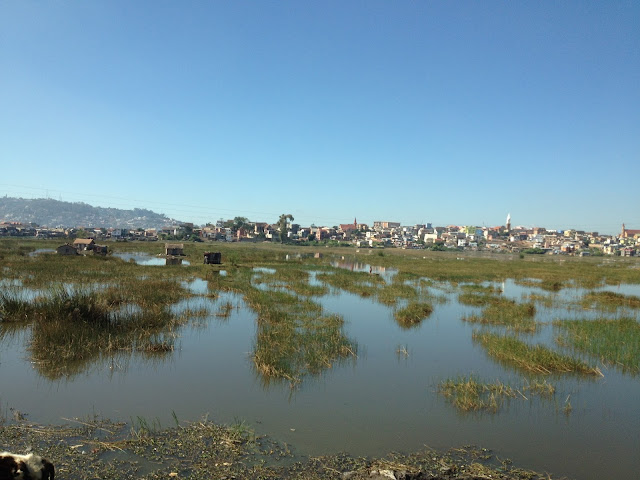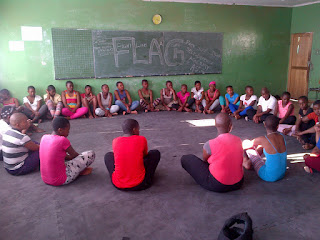 |
| Sewing and posing all at once-a perfect Saturday afternoon! |
I was confused, as she appeared to be perfectly fine. We had the same conversation for another two days, with her still looking perfectly well. The fourth day, she was back at school.
When I noticed her home again a few months later, I took advantage of my improving language skills and asked more questions. I learned that she was home because she was menstruating. As a single orphan (in Lesotho, single orphans have lost one parent, double orphans have lost both) with a father who works outside of Lesotho, she had no access to menstrual hygiene products and realistically, no money with which to buy them.
This troubled me until I attend the LGL Summit in June. There I learned an inexpensive and easy way to RUMPs or Reusable Menstrual Pads. Since then, the women in my organization and I have been planning a time to make these with both women and girls in my community.
One of the things I love about this particular pattern is it does not require special skills or materials. It uses only fabric, towels or other absorbent material, thread, a needle, and a button. The fabric and towel do not even have to be new, just clean, making it the perfect project for people with limited resources.
The women of my organization and I have been planning this day for a few months, scheduling it for after most of work with the Chicken Coop Construction would be completed. Girls were asked to bring their own fabric, however, I supplied the other sewing materials thanks to my mom and RPCV Lisa supplying me with more sewing notions than I could ever use.
Finally the day arrived and the fun began!
Step One:
 |
| Trace the pattern onto the material and cut it out. You need to copies. |
Step Two:
Hold the two cut pieces together, pretty side in. Place ribbon or material sewn into a strip near the top and bottom of the pad. Pin everything in place.
Step Three:
 |
| Sew the two pieces of fabric together, but stop with a few centimeters not completed. Turn the work right side out and finish stitching. |
 |
| Step Three is best done with friends, conversation, laughter and music! |
Step Four:
Sew a button on to one wing of the pad and a button hole on the other wing.
Step Five:
 |
| Show off the completed work. The middle pad currently holds towel, to show how these beautiful works of art with in fact work. |
 |
| Posing with a pad-pride in accomplishments and empowerment! |
 |
| Strike a pose and show off your girl pride! |































